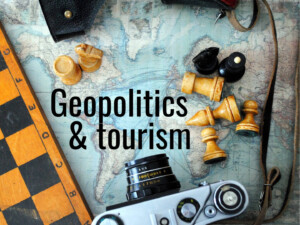Tourism, capitalism, & the coronavirus crisis: What is to be (un)done?

Does the travel & tourism industrial crisis induced by government responses to the COVID-19 pandemic warrant a “full-spectrum intervention” to ‘democratise’ tourism for a ‘post-capitalist’ future?
Raoul V Bianchi thinks so.
It’s a “Good Tourism” Insight.
[Thanks to Jim Butcher for inviting Dr Bianchi to write a “GT” Insight.]
The global COVID-19 pandemic has triggered an unprecedented crisis.
Not only has it brought the global economy to a standstill, leading the IMF to predict that it would result in the worst recession since the Great Depression of the 1930s, the pandemic has revealed deep structural fault lines within and across societies, potentially heralding a fundamental restructuring of the global economy.
The pandemic has also highlighted the magnitude of tourism’s global economic importance while starkly revealing its underlying vulnerabilities and myriad injustices.
Reliant as they are on open borders and perishable inventory that cannot be stockpiled, the tourism industries have been some of the hardest hit, not least in the tourism-dependent economies of southern Europe and small island developing states in the Global South.
In the space of a few short months between late 2019 and early 2020, the pandemic shifted public attention away from concerns related to the effects of ‘overtourism’, to the urgent need to ‘rebuild’ tourism economies and protect the businesses and livelihoods devastated by quarantine and lockdown measures.
What kind of tourism are we (re)building?
But the question remains, given the collapse of a seemingly impregnable economic ideology and the challenge to the unquestioning belief in tourism’s resilience, what kind of tourism business model should be rebuilt out of the ruins of the pandemic?
At first glance, the current pandemic-induced crisis is the antithesis of the previous overtourism crisis, resulting in the complete disappearance of tourists from the streets, squares, and beaches of destinations worldwide, causing the President of the European Central Bank to ponder if we were witnessing the ‘burial’ of mass tourism.
However, upon further reflection, some have argued that the crises of both overtourism and ‘undertourism’ are themselves indicators of much deeper, systemic imbalances whose roots lie in the unequal dynamics of tourism capital accumulation and the concomitant tendency towards tourism monocultures.
Also see Jim Butcher’s “GT” Insight
“In praise of holiday Fordism”
Others have hailed the pandemic as a turning point that offers an unprecedented opportunity to challenge the structure of an international tourism ecosystem premised on ever-increasing arrivals and growth.
Many governments, such as that in the UK, are predictably keen for a return to ‘pre-pandemic’ levels, while the UNWTO promotes a corporate-backed agenda of inclusive and sustainable growth.
However, in some places, citizens and local governments are increasingly prepared to challenge the untrammelled growth of tourism.
For example, after a long campaign by grass-roots activists, the Italian government has banned cruise ships above 25,000 tonnes from entering Venice’s lagoon. And in Key West, Florida local residents voted to limit cruise ship traffic and reduce the number of disembarking passengers.
The contrived scarcity of market capitalism
Few tourism rebuilding proposals offer more than familiar recipes of diversification, innovation, and technological ‘solutionism’ or calls to ‘get off the beaten track’ — a standard trope of elite environmentalism — and visit “hyperlocal and remote” areas.
At best, many represent localised, targeted interventions designed to deal with a specific set of problems rather than attempts to directly confront the power of tourism capital and its organising logic.
Moreover, hastily imposed restrictions on tourism potentially generate another set of concerns, such as the employment needs of port workers who have had little choice but to rely upon the growth of cruise ship arrivals.
Also see Peter Semone’s “GT” Insight
“What is destination human capital? It’s the people!”
This contradiction cannot be resolved by merely prioritising growth over the environment, much less elitist appeals to attract the ‘right kind of tourists’, often code for high-spending ‘luxury’ tourists.
The schism between workers and environmental interests runs far deeper. It is rooted in the contrived scarcity of market capitalism, which denies workers the ability to make meaningful choices over their livelihoods.
There is some evidence of progressive “diverse economies”, including indigenous enterprises that have embraced tourism in the struggle to reclaim ancestral lands.
However, the sheer breadth and scale of social and environmental injustices and structural imbalances perpetuated by processes of tourism capital accumulation will require more than the advocacy of micro-entrepreneurial initiatives on the margins of global capitalism, or counter-productive disagreements over whether we should focus on ‘regenerative’ or ‘sustainable’ tourism.
Can we imagine a world beyond capitalism?
Regenerative tourism advocates identify the inadequacies of “the current capitalist system in addressing the failures of mass tourism”.
However, by admonishing tourism businesses and national tourism organisations to ‘lead’ the change to ensure “enterprises deliver net positive impacts to the places and society in which they operate”, its advocates underplay the necessity of confronting the deep-seated roots of capitalism’s social and ecological contradictions.
At best they end up promoting the co-existence of alternative tourism business models within the framework of a seemingly ‘ethical’ global capitalism.
Also see the “GT” Insight by Movono, Scheyvens, and Auckram
“What do the people want? Reimagining Pacific Island travel & tourism”
Increasingly, B Corp certification is promoted as a driver of corporate sustainability.
While this may represent a step in the right direction in terms of remaking tourism business models along socially and environmentally responsible lines, B Corps certification is neither legally enforceable nor does it challenge the profit-driven logics of capitalism and its handmaiden, perpetual growth.
We thus appear unable to imagine a world beyond capitalism.
To paraphrase late cultural critic Mark Fisher, a “capitalist realism” with its pervasive “business ontology” disables the possibility of imagining alternative futures beyond market capitalism.
This is all the more surprising when one considers the extent to which even sections of the mainstream media, including such luminaries of the business press as Martin Wolf, have criticised the ‘rigged’ nature of unbridled global capitalism.
Indeed, the ideal of a Smithian free market capitalism no longer exists, if it ever did.
Meanwhile, capitalism capitalises on a crisis
The 2008 financial crisis and now the COVID-19 pandemic have fundamentally altered the organisational structures of global capitalism.
Global capitalism increasingly resembles state monopoly capitalism in which global mega-firms, including major travel companies, are kept afloat by a combination of state-backed credit and private equity investors.
Although the unprecedented intervention of governments to avert mass bankruptcies and sustain livelihoods (admittedly, limited to high-income countries) might not spell the death-knell for neoliberalism just yet, the pandemic has demonstrated how quickly states and communities can repurpose economic activity for the public good, prioritising co-operation and human well-being over competition.
Also see Ani Thompson’s “GT” Insight
“Living the good life: Can tourism help save a community from itself?”
The trajectories of post-COVID tourism will ultimately be shaped by a number of factors, including but not limited to the uneven territorial distribution of the pandemic’s impact (including vaccination programs), shifting geopolitical alignments, and the variable characteristics of destinations’ political economies.
However, there are already signs that large, well-capitalised firms are exploiting the crisis to expand their portfolio of assets and consolidate their market dominance.
Investors too are seeking to capitalise on the downturn in equity prices to purchase stakes in key corporations likely to weather the storm.
Having just fought a two-year battle with low-paid cleaners over wages and working conditions, hotel giant Accor recently announced that the “biggest pandemic hotel investment bargains are still to come”.
Meanwhile, Hilton’s CEO has reassured investors that the business will seek to ensure higher margins using more efficient, less labour-intensive post-COVID business models.
Untangling myriad strands of injustice
By ignoring the deep-rooted, systemic structures of predatory capital accumulation, which has fuelled the accelerated growth of tourism infrastructure and real estate development — particularly in southern European cities and the Mediterranean — we stand little chance of:
- Addressing tourism labour rights and social justice;
- Wresting control of destination planning from development interests;
- Decarbonising tourism; and
- Implementing urgent climate change adaptation measures.
Catalysing a transformation towards an equitable and just tourism will involve untangling the myriad strands of social, economic, and environmental injustice and directly confronting the systemic roots of the epochal crisis the world now faces.
It would be both impossible and politically inappropriate to devise a blueprint for an ‘industry’ as diverse as tourism and the variants of capitalism within which it operates.
Also see Paul Rogers’ “GT” Insight
“Why build well-being into destination resilience and tourism recovery?”
However, the transition towards post-capitalist tourism would, by necessity, involve supporting distributed models of ownership and co-operative entrepreneurship, with limits imposed on the private accumulation of capital.
It would also necessitate strengthening democratic-citizen control over tourism investment and the pre-distribution of community resources.
Public registers of investors and the right of communities to sanction companies who breach certain social and environmental standards should be included.
This in itself is likely to help diffuse the competitive struggle between capitals and the relentless drive for profit which ultimately sustains perpetual growth.
A salient feature of tourism is that it is collectively produced out of an amalgam of businesses, economic and non-economic activities, cultures, and nature, whilst its value is overwhelmingly appropriated by a small number of corporate investors.
Paradoxically, this opens the door to socialise the gains from the tourism economy through equitable models of tourism revenue-pooling and equity sharing or an annual residents’ dividend along the lines of the Alaska Permanent Fund Dividend (although, drawn from non-fossil fuel revenues).
A full-spectrum intervention
By now it is clear that after 30 years of institutional sustainable policies, programs, and strategies, the transition away from a growth-led extractive model of tourism capital accumulation will not be granted by disinterested political elites.
Nor can it be left to a few enlightened companies or community initiatives.
Neither can democratising the gains from tourism, and its underpinning business ecosystems, be achieved through an appeal to alternative values alone.
An equitable, sustainable and yes, regenerative tourism requires nothing less than a full-spectrum intervention at multiple scales and throughout different institutional domains, from local through to regional and global contexts.
Technocratic solutions enacted in isolation, or which fail to confront concentrations of corporate-financial power, will not be sufficient to address the deeper structural logics of this crisis, much less the impending climate catastrophe.
There is no single blueprint for action, however, it will entail dismantling extractive, corporate-managed models of tourism development and, as far as possible, severing the link between tourism and speculative real estate activities.
Although the role of states will be crucial, this is not simply a call for more regulation, not least given the complicity of many local governments in privatisation and land sales. Rather, policy and decision-making bodies must be democratised in order that destination investment decisions be governed by more participatory management of tourism activity within ecological-planetary limits.
Also see “GT” publisher David Gillbanks’ op-ed
Has ‘Future of Tourism’ failed host communities?
Given the trillions spent by high-income states on ensuring the survival of major firms during the pandemic, including airlines, the active planning of tourism must involve transnational co-operation to expand job guarantee and income protection schemes at an international scale.
This is perhaps something that the largely ineffective UNWTO could consider advocating and co-ordinating. And it would insure the livelihoods of low-income tourism workers, particularly in the Global South, in the event of such a radical downturn in tourism.
Ultimately, the success of destinations can no longer be subsumed under the logics of competitiveness and growth but should be replaced with new metrics of economic performance, human welfare, and environmental health, similar to those adopted by some US states and advocated by the EU.
Only in this way can we reconfigure tourism business models and destination economies in line with the self-managed and co-operative use of natural and other ‘assets’ which underpin the value of tourism.
Tourism will not thrive and indeed may cease to exist in many parts of the world without recognition of the fundamentally collective nature of the economic systems which underpin it, nor without the protection and revitalisation of the ecological and atmospheric commons upon which all livelihoods ultimately depend.
Agree? Disagree? What do you think? Share a short anecdote or comment below. Or write a “GT” Insight of your own. The “Good Tourism” Blog welcomes diversity of opinion about travel & tourism because travel & tourism is everyone’s business.
Featured image (top of post): Coronavirus crisis. Image by geralt (CC0) via Pixabay.
About the author

Raoul V Bianchi is Reader in Political Economy in the Department of Economics, Policy and International Business at the Future Economies Research Centre, Manchester Metropolitan University. Dr Bianchi’s work is focused on the international political economy of tourism, and research into emerging dynamics of tourism and (post-)capitalist development, with an emphasis on southern Europe and the Mediterranean. His work also encompasses tourism in the context of politics and international relations; border politics; destination governance; and socio-environmental justice.





